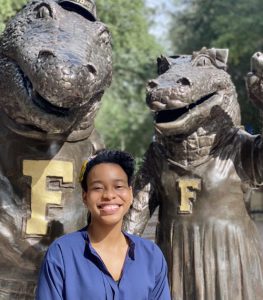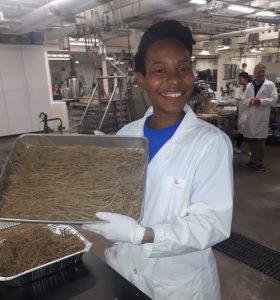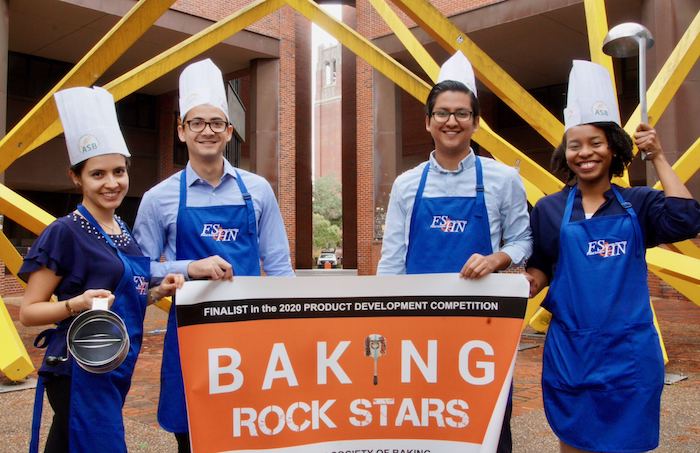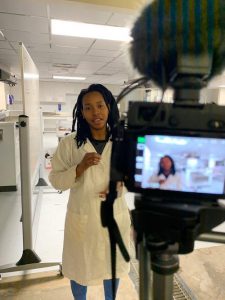 A warm welcome to Vicnie Leandre, a graduate student pursuing her M.S. in Food Science and Human Nutrition. Vicnie is from Haiti and has been working on a sorghum-based pasta under the mentorship of her advisor, Dr. Andrew MacIntosh. While looking forward to her graduation this December, Vicnie took time out of her busy schedule to share how she chose the FSHN program, what the public should know about food scientists and food sustainability, and her dreams of empowering food entrepreneurs and students in Haiti.
A warm welcome to Vicnie Leandre, a graduate student pursuing her M.S. in Food Science and Human Nutrition. Vicnie is from Haiti and has been working on a sorghum-based pasta under the mentorship of her advisor, Dr. Andrew MacIntosh. While looking forward to her graduation this December, Vicnie took time out of her busy schedule to share how she chose the FSHN program, what the public should know about food scientists and food sustainability, and her dreams of empowering food entrepreneurs and students in Haiti.
Would you share how you chose the M.S. in Food Science and Human Nutrition program at UF?
The first time I heard of the University of Florida was when I heard USAID wanted to support students wishing to complete a Master’s degree at UF. At the time, I knew nothing about UF and was unaware that Florida has such a great school with so many resources. Now that I am here, I am impressed by how faculty and staff care for the students and provide many options and resources so that students can succeed academically, socially, and in their individual pursuits.
Would you tell me about your current project? How did you become interested in it?
I have spent the last year and a half working on a sorghum-based pasta. Because of my background, this project was very special to me. I am from Haiti, and while Haitians consume a lot of pasta, we do not produce wheat. However, we do produce sorghum, an amazing cereal that is heat- and drought-resistant and is slowly digested. Americans are less familiar with sorghum, but this cereal is very popular in Haiti. Before I came to UF, I began researching more food applications for sorghum while working at Laboratoire Chibas, a laboratory affiliated with University Quisqueya.
By providing healthy food that meets people needs, we can tackle food insecurity and food safety at the same time while preserving the ecosystems that we depend on for survival.
After I got into the M.S. in Food Science and Nutrition program, my advisor Dr. Andrew MacIntosh told me the department had just received an extruder from this amazing company named Demaco down in Melbourne, FL. It was almost like a sign given the timing. I spent the first three months of my program getting to know Exie (the extruder) and how she works. For example, the more you feed the machine, the faster the pasta forms.

The extruder is also complicated to clean because of the heavy parts and the fact that you need to clean everything very fast, otherwise the dough will act as a cement and you lose the machine! In the beginning, it took five people three hours to clean everything, but now we are much faster at this task. Adding to the difficulty, I am creating a gluten-free pasta which is more difficult to make than wheat-based traditional pasta. I’ve learned that making good pasta is more than mixing flour and water.
What do you believe is the most important facts the public should know about food science?
I feel like a lot of people outside the food science world are not aware of what we do. I had some encounters where I said that I was a food scientist and people automatically think I am a chef. Food science is so much more than cooking. You have safety, regulation, processing, sensory, and chemistry with the science behind a slice of bread, even more after it is toasted. Or, in another example, principles of food science explain why a soda tastes better cold. It is a very complex system that connects with a lot of others disciplines such as engineering and marketing.

I also think that now, more than never, we need to focus on food sustainability to produce and consume food smarter. Food sustainability is an area that is neglected, and I think that addressing it could help solve multiple issues at once. By providing healthy food that meets people needs, we can tackle food insecurity and food safety at the same time while preserving the ecosystems that we depend on for survival.
What do you want to do after graduation?

I want to go back to Haiti and start a food incubator that will serve a dual purpose. The first goal is to offer technical guidance to food entrepreneurs and try to reduce cost barriers by having a community kitchen. The second goal is to partner with universities that offer food technology/processing classes and employ students as interns. Doing so means we would have staff that are competent and passionate about food, while the students have an opportunity to test their theoretical knowledge in the real world and gain invaluable experience.
As the incubator grows, I plan to expand some services such as accounting, marketing, procurement, and logistics with the same university partnerships, connecting with relevant departments. Ultimately, it is an ambitious project that will fill multiple gaps in the academic and food entrepreneurship scene in Haiti.
What do you like to do in your free time?

That is good question, although “free time” has been rare these past months. After leaving Haiti in 2012, I pursued a bachelor’s degree in food sciences and engineering at the University of Tianjin, where I stayed for five years. So now, I like to binge watch historical Chinese dramas as they help me practice my Mandarin. In fact, I speak six languages, so I am always practicing!
I also like to bake and try new cooking recipes. I used to make DIY cosmetics as a hobby and while I am not as active, I still look for tutorials, articles to read, and research ingredients for a cosmetics line that I have been dreaming of creating.
What is your most favorite food and your least favorite food? Why?
That is a difficult question! I don’t think I have a favorite food because I have a lot of favorites. I love “fritay”–a Haitian dish of fried and flattened plantains, fried meat and spicy, sour, salty shredded cabbage, and carrot salad. Or white rice and lalo (jute leaves). I also love ramen.
As for least favorite food, I don’t really have one. I don’t particularly like anything too slimy.
Below: Vicnie demonstrates how to make pasta–look out for Exie the extruder!
Note: Some images in this post were taken prior to national guidelines of face coverings and social distancing.
Interested in learning more about the M.S. in Food Science and Human Nutrition Program? Read more here!
P.S. The Discover FSHN Series highlights the unique experiences of UF’s Food Science and Human Nutrition students, faculty, staff, and alumni. Want to read more about the amazing work going on in the FSHN department? See our previous features below:
Undergraduate Students:
Shannon Mai, Dietetics
Alex Colon, Dietetics and Jenny Duong, Food Science
Jackie Shannon, Nutritional Sciences
Jennifer Jordan, Food Science
Lily Tucciarone, Dietetics
Graduate Students:
Savanna Curtis, Food Science
Carley Rusch and Matthew Beke, Nutritional Sciences
Alexa Hosey, Dietetics (MS/DI)
Faculty:
Dr. Naim Montazeri, Food Science/Food Virology
Dr. Jeanette Andrade, Dietetics
Dr. Zhiyong Cheng, Nutritional Sciences
Dr. Juan Andrade Laborde, Global Nutrition
Staff:
Sharyn Passeretti, Lab Specialist
Herschel Johnson, Manager of Student Services
Alumni:
Becca Solch, Nutritional Sciences, Postdoctoral Research
P.P.S. Learn more about FSHN’s renowned programs below!
Undergraduate Programs:
Dietetics
Food Science
Nutritional Sciences
Graduate Programs:
M.S. Dietetic Internship Program
M.S. Food Science and Human Nutrition
Ph.D. Food Science
Ph.D. Nutritional Sciences
 0
0
